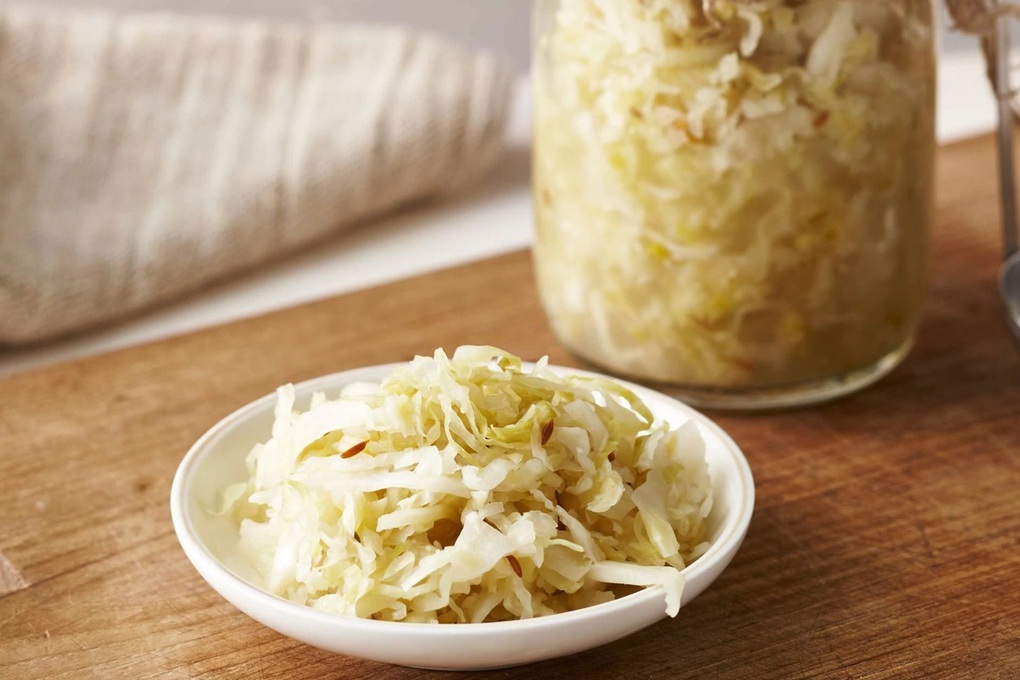With simple ingredients, including only cabbage and salt, pickles are not only a familiar side dish but also a valuable source of nutrients for intestinal health, immunity and metabolism.

Pickled cabbage is considered an inexpensive superfood that helps improve digestion and overall health (Photo: Taste)
A rich source of probiotics for the digestive system
Pickles are the product of lactic fermentation, in which beneficial bacteria convert sugar in cabbage into lactic acid, helping to create a characteristic sour taste and prolong shelf life.
This process also produces many probiotics, especially Lactobacillus plantarum, which helps support digestion, stabilizes intestinal motility and improves the balance of intestinal microflora.
A study published in the World Journal of Microbiology and Biotechnology showed that fermented bacteria in pickles can survive when passing through the stomach and exert their effects in the small intestine, thereby helping to improve digestion and reduce symptoms such as bloating, indigestion or bowel disorders.
Boost immunity from the small intestine
More than 70% of the body's immune cells are concentrated in the intestine. Therefore, when the intestinal microflora is healthy, immunity is also enhanced. Some studies have shown that regularly eating fermented foods such as pickles can help reduce the risk of respiratory infections and intestinal inflammation.
Sharing with the New York Post , Dr. Steven Gundry, a heart surgeon, emphasized that pickles can bring "amazing" health benefits after just 30 days of eating them.
Specifically, after only about 30 days of regularly adding pickles to daily meals, users can see a significant improvement in intestinal health thanks to a significant increase in microflora. This is very important for long-term health.
Postbiotics – “good residue” after fermentation
Not only do they contain probiotics, pickles also produce postbiotics. These are biological compounds released when beneficial bacteria break down plant matter. These substances include enzymes, short-chain fatty acids, antimicrobial peptides, and fragments from bacterial cell walls.
Postbiotics act as a “powerful assistant” to the immune system, helping to reduce inflammation, protect the intestinal mucosa and help prevent chronic diseases such as enteritis, allergies, and even colorectal cancer.
A 2021 study from the University of California also showed that pickles are more effective at protecting intestinal cells from inflammatory damage than fresh cabbage. This result opens up a new approach in supporting the treatment of non-infectious inflammatory bowel diseases.
Sharing the research results, the main author - Dr. Maria Marco, a food technology expert, emphasized that even if people only eat one serving of regular pickled cabbage..., they can still see their long-term effects in fighting inflammation of the digestive tract.
In addition, this food also helps restore the digestive tract if a disorder occurs.
Reduce plant toxins
Many vegetables contain natural substances such as lectins and oxalates that can irritate the intestines or interfere with nutrient absorption if consumed in large amounts. However, the fermentation process significantly reduces these compounds. Therefore, pickles can help the digestive system feel more comfortable.
Supports inflammation and metabolism
Thanks to its richness in organic acids and enzymes, pickles help improve the process of food breakdown, thereby reducing pressure on the digestive system.
Some studies suggest that fermented foods may also help regulate blood sugar and cholesterol, two factors that can increase the risk of developing heart disease and type 2 diabetes.
In addition, the pickling process often uses onions and garlic to enhance the flavor. In addition to this benefit, compounds from onions and garlic also have antioxidant effects, help protect blood vessel walls, and contribute to protecting the cardiovascular and nervous systems.
How to eat pickles to ensure health benefits?
Although it brings many benefits, consuming pickles also requires reasonable adjustment. If you are not used to eating fermented foods, you should start with a small amount and gradually increase to about 100-150g/day.
Forcing the intestines to receive a large amount of probiotics and fiber suddenly can cause bloating, loose stools or temporary digestive disorders.
People should eat homemade pickles or choose to buy pickles that do not contain preservatives or added sugar. Some industrial products on the market can contain quite high amounts of salt or sugar, which takes away from the inherent healthfulness of this dish.
In an era of industrialized eating habits, adding traditional foods like pickles can be a simple yet effective choice to take care of your intestinal health every day.
Source: https://dantri.com.vn/suc-khoe/loai-sieu-thuc-pham-re-tien-giup-cai-thien-suc-khoe-20250615172817448.htm























































































![[Infographic] In 2025, 47 products will achieve national OCOP](https://vphoto.vietnam.vn/thumb/402x226/vietnam/resource/IMAGE/2025/7/16/5d672398b0744db3ab920e05db8e5b7d)













Comment (0)